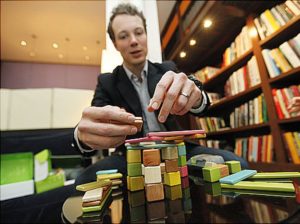Cleveland Cornhole Company is a small business specializing in custom cornhole boards and rustic style furniture. Started by Chad Gerzeny a few years ago, as a way to make a little cash on the side, morphed into a legitimate business opportunity. These cornhole boards are high quality, and are highly customizable, they take him days to finish because of the intricacy that goes into each individual board. Currently the boards are made by Chad Gerzeny at his own house, but he plans to transition into a retail store within the next few years.
Growing up playing the game of cornhole was the true inspiration for Cleveland Cornhole Co. Initially Chad started with a single set of boards that he made for himself out of his garage. After enjoying the work so much on the first boards it began to feel almost therapeutic to him. As others saw the quality and craftsmanship of the boards, Chad began to receive individual orders from friends and family friends. As he graduated college and time went on he utilized social media to reach a broader market. And now he is at the point to where he cannot keep up with the orders because of his day job.
Cle veland Cornhole Co. also makes rustic household furniture, from coffee tables to farmhouse tables. Chad Gerzeny has made most of the furniture in his current home, and it will be interesting to see how moving into a retail store impacts his business.
veland Cornhole Co. also makes rustic household furniture, from coffee tables to farmhouse tables. Chad Gerzeny has made most of the furniture in his current home, and it will be interesting to see how moving into a retail store impacts his business.




